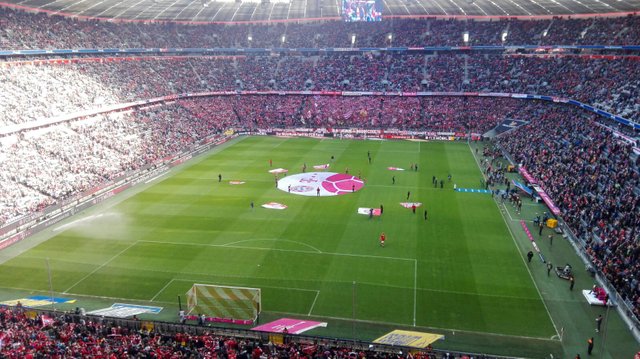This season, many supporters of teams in the Bundesliga are astonished by this year’s low excitement in the ongoing competition. This also leads to an unattractiveness of the division in the international comparison. The whole situation reached its low point when Bayern Munich was the only team to survive the group stage of the Champions League. In this article, I want to name the reasons why the Bundesliga is stuck in a rut.
Total dominance
For a moment, the battle for the Championship this season seemed to be given when Bayern had some issues in the first few games, while Borussia Dortmund played in a breathtaking way bringing them to clear wins like the 5-0 against Europa League Starter Cologne back in September.
After a clear defeat in the UCL group stage against Paris, it seemed like a bad joke when Bayern released Carlo Ancelotti to bring back 71-year old Jupp Heynckes who led Munich to the treble in 2013. Suddenly, they accomplished the results they desperately needed. After a few wins back to back and while Dortmund started to struggle, which led to the sacking of Peter Bosz as well, everything is just the same as the years before and Bayern are about to win the title number 6 (!) in a row.
There is no real concurrent for Bayern and even when they face problems like they didn’t over the last couple of years, the top of the table still seems to be dream for any other Bundesliga team. After they released Peter Bosz, Borussia Dortmund went on with Peter Stöger who is without a doubt a good coach but not the one Borussia needs to create a promising plan for the upcoming years. Leipzig still does a good job but the games against Bayern in both league and cup clearly showed that they are not on that level yet and still have some way to go in order to get there one day.
European Starters
Another reason is that a lot of teams finished the last season extraordinary positively. This led to the situation, that except for Bayern and Dortmund none of the German teams starting in the UCL and UEL were used to the additional games.
Freiburg, who finished 7th last season got eliminated right away in the play-offs for the Europa League while with Cologne, Berlin, Hoffenheim and Leipzig four new teams had to play another six games (except for Hoffenheim who faced Liverpool two times in the Champions League play-offs). While Leipzig and Hoffenheim were a disappointment in the European competitions they did quite well in the Bundesliga campaign.
Hertha doesn’t have to fear the relegation anymore but it will be a tough challenge to reach Europe again. Cologne is facing a year in the second division after only three years due to a historically bad first season-half with only six points.
For the clubs that are not used to have weeks with two or more games it is usually a situation they must cope with first, which leads to worse results in the league because they drop a point from time to time because of the additional burdens. Sure, it’s sort of a coincidence that there were so many newcomers this year but it makes the competition less attractive.
Long-term plans?
Whether you win the Championship, the Cup or participate in the Champions League – you’ll get rewarded properly. If you don’t? It becomes a tremendously tough challenge to form a team that comes after your wishes and that leads you to the desired success, such as playing in the European Cup. In fact, there is hardly any team in the Bundesliga that can realize a long-term plan. Exactly this circumstance applies to most teams in the mid-table and is the reason why the football momentarily played is that unattractive.
Sure, there are philosophies about which way to go. Always with young talents from the own academy, always with a coach that manages the club for a while and has time to implement his idea of playing football. And of course, there are a lot of clubs within the Bundesliga that could represent Germany in international competitions as well. Frankfurt, Stuttgart, Hamburg, to name only a few of them.
But often enough those clubs are caught up by reality. Coaches are getting sacked, players have to be sold, prices for players are ridiculously high (which brings us back to the first lines of this paragraph). For those teams it’s all about surviving, about not being relegated after 34 games played. And the ideas how to play as successful as possible are widely known and accepted. Always against the ball, always with five defenders in the backline and always seeking for the counter-attack. When nobody wants to have the ball, things can get really frustrating for the viewer.
The Bundesliga desperately needs a competitor in the battle for the Championship. In order words: An interesting season (which isn’t determined after half of the matches are played) requires Dortmund and Leipzig at their very best for full 34 matches. Things can get better as Schalke, Leverkusen and Gladbach are doing good so far and regain their former strength. A lot of teams should scrutinize themselves if there isn’t more to the beautiful game of football than only having success.
